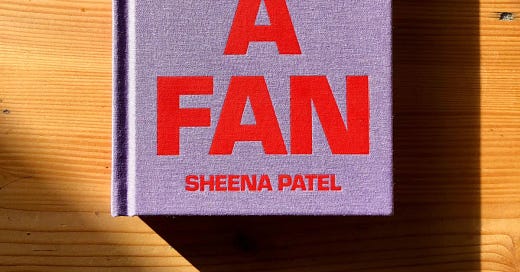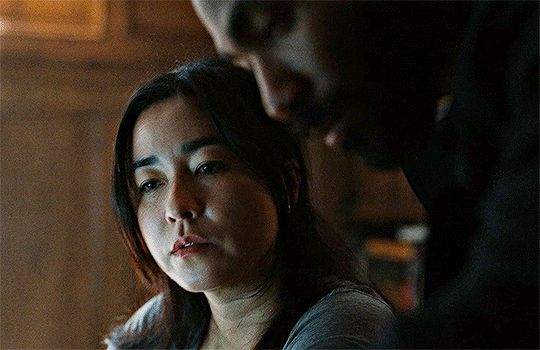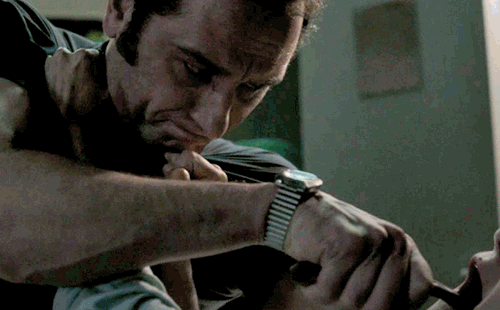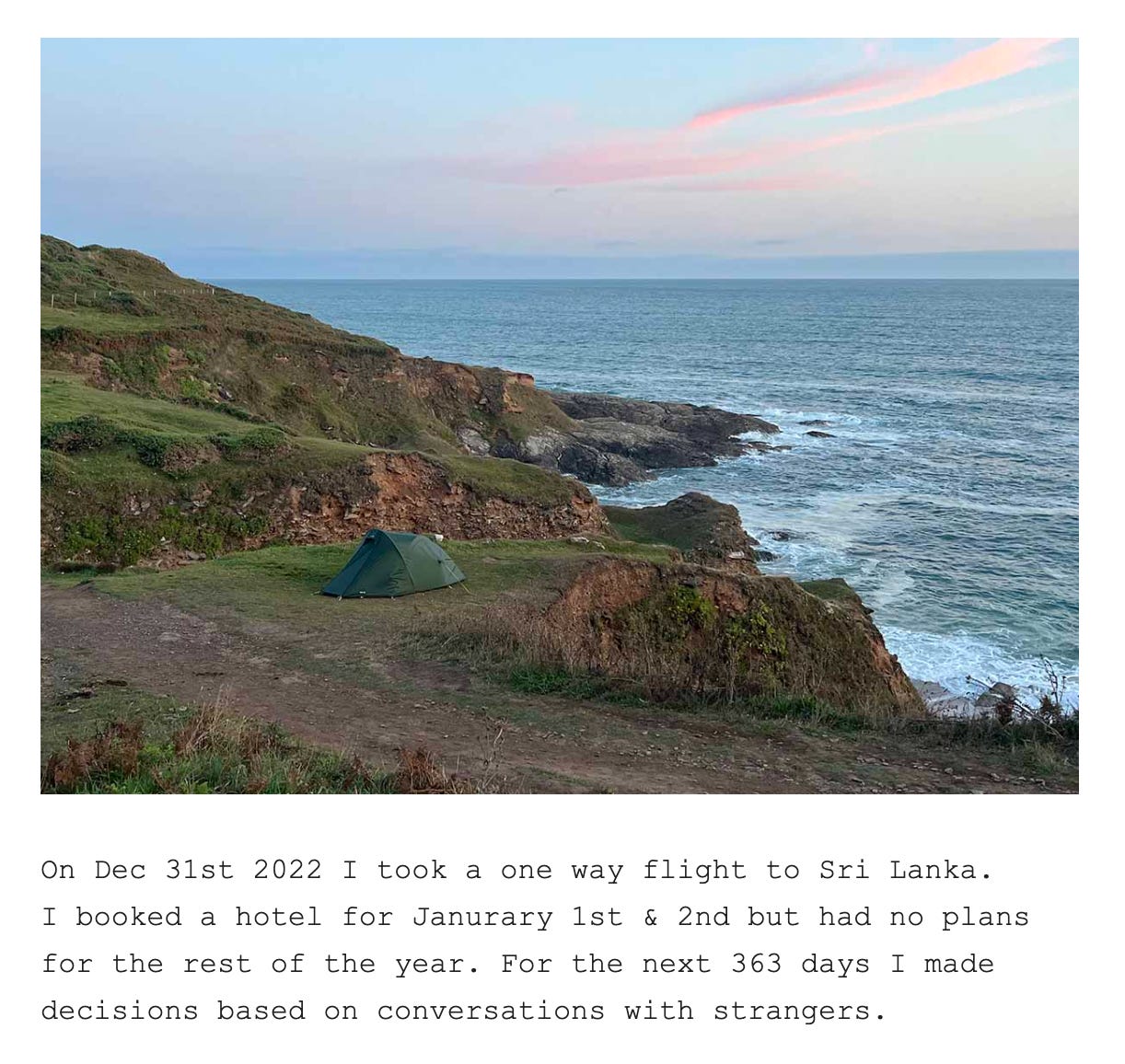In this issue:
Headliner I’m A Fan author Sheena Patel on terrifying the reader and bottling the now
Revival The Americans (love + spying = complicated)
Aftershow Mr Bingo’s gap year revelations, lost pet posters from the 70s/80s, the tyranny of the personal brand, Barbara Kruger raising doubt, Jia Tolentino on love, Mk.gee on loop
The great thing about being your own editor on here is that you set your rhythm and focus. You are not beholden to an official release schedule, a launch date, who’s trending or the moment everyone else seems to be fixated on (Hi Taylor and Travis aka TNT).
In that sense, finding a book like Sheena Patel’s fierce and furious I’m A Fan from 2022 feels like it’s just been published. Well, it has – in my world. A miracle that I hadn’t come across it sooner, which would have sucked the serendipity out of its discovery. Why? Because it would have been hard to shield myself from the deluge of other people’s feelings online before I could locate my own.
The Discover British Book of The Year award winner is a modern phenomenon, strangely cathartic in its scathing depiction of the narrator’s unhinged descent into obsession over “the man I want to be with” (a celebrated artist, married, emotionally unavailable, treats her like a yo-yo) and “the woman I am obsessed with” (his other paramour who’s a far bigger deal on social media, and whose book launch the narrator has been monitoring “like she’s planning a drone strike”).
There is comedy in the self-obliteration she teeters on the brink of day after day, as she spits poison (in the author’s words). But the book is also designed to shake you. I‘m A Fan’s strengths are the things that have repelled some readers. The inner monologues and breathless episodes for chapters, expelled like caustic posts online (finely crafted though they are, in my opinion).
“… or I am having such a good time, I have my back to where the dj booth is, and my friend grabs me and says, don’t turn around but the man you want to be with is coming over, and I say, what the fuck do I do and they say, act cool but also he’s a dick, fuck him and I turn around and he’s in front of me and I say, nice tune and he laughs and says, I thought you’d be here, and I say nothing just look glowing and happy because I am having regular sex and can afford facials and he catches my waist as he talks or he takes my hand and says, it would be nice to see you and I say, yeah maybe and he says, can I call you and I say, sure and we talk and I tease him light-heartedly, it’s all so light, it’s all so light, it’s all so heartedly, and I throw all the pain up in the air like juggling balls in the blue and shining sky and I say, I have to get back to my friends because I want to leave him wanting more but really it’s not that deep, I just don’t care anymore and he says, oh alright, looks disappointed and says, I’ll call you and I nod warmly but in a non-committal way as if saying goodbye to an old school teacher I’m trying to get away from and turn around.” (I like the world in my head where I can rehearse)
Chapter titles that resemble jumbled scrubbings from comments and chats. They were conceived to undermine the accompanying text, in fact, and offer light relief like a meme “because that gallows humour is sometimes the only thing that can really get to the heart of how fucked it is to be alive right now”, as she told Dazed.
A selection:
dick from someone who doesn’t care if I live or die
dis–
the math ain’t mathing
i might look innocent but I screenshot a lot
viennetta really is the epitome of luxury
I start my day with a complex blend green juice
nepotism it girl
unbothered moisturised happy in my lane focused flourishing
I’m A Fan has little to no interest in likeable characters (aside from the narrator’s supportive boyfriend, perhaps). In Patel’s words, this book is always on a tilt and she wanted to keep the truth moving so it’s not easy to sympathise with anyone. Moral virtue is secondary to the pursuit of truth, no matter how ugly it is.
“I sleep with him five times spaced over six months in hotels dotted about Soho and King’s Cross. I feel very grown-up having sex in hotels and lying to my boyfriend about having meetings to attend so late into the evenings. We do not have sex for connection, we have sex for release.
“I’ll probably be accused of leveraging this relationship to get the status I want but if I can’t get it from having him, I’ll get it from telling you how I couldn’t.” (j’accuse)
Later, she discovers her boyfriend has got the venue wrong for a show they are supposed to attend. Her lips twitch at how much she wants to hurt him.
“Under the Brutalist architecture and surrounded by water, greenery and the concrete that feels like home to me – I scream at him. I scream at him and call him a fucking cunt for getting it wrong, he wasted money, we missed the show, I scream until my hair turns into a basket of snakes not caring if there are residents looking out of windows or of the genteel people walking to shows and drinks and dates, averting their eyes from this unhappy couple having a meltdown in public. My boyfriend tries to escape from my verbal onslaught but I hunt him down through the maze of buildings swearing at him, spitting contempt out in poisonous bloody bites, him in a brace position and only when I get tired do we go home.” (light it up)
Note the contradictions in her self-sabotaging behaviour, although it’s more about ambivalence in the author’s eyes. How she is aggrieved by racism and patriarchy in society yet inadvertently subjects herself to those systems through her obsession with status by association and yearning for agency. Worth reiterating here that she is a woman of colour (read: outsider). As such, the onus to acquire influence ways heavy, even if it means leveraging her Otherness online or partaking in the neoliberal project of performative productivity.
“Are the cravings for a fanbase an expression of how politically powerless we feel? Or is it something else entirely? Though we insist we are Socialist and Marxist in our ideals, is social media and our pursuit of fame within this structure not the purest expression of individualistic, Thatcherite neo-colonial politics where we transform into scripted individual brands, launching ourselves like start-up companies while masquerading as being ‘in service’ to our ‘communities’ by taking up ‘space’ as if by being true to ourselves, we’re doing everyone else a massive favour?”
“What is the line between being vulnerable and prostrating yourself for a system that won’t recognise you? The onus is never on the system to adjust its hardness, it’s on you to shapeshift and acquiesce. Do I don vulnerability as a weapon against this culture? – If you require me to be hard and harder to fight you, I will rebel by being soft like a jelly-beaned being, but like anything, you need to be softer and softer to have the same impact.” (on second generation immigrants performing Otherness)
The no-filter nature of the narrator gives us an unvarnished perspective on this character and her position in the world, delusions n’all. Some of us might even detect traces of ourselves in her compulsions and neurosis. This on
“At the beginning, he chases me with focused intensity. Over the course of the first few months, I give in to him, giving up my scepticism and think, if he wants me this much and only this way, of fine let’s see what happens. However, as if aware of my softening towards him, aware the chase is over and he has me, he initiates gaping silences, he tells me to get in touch with him in a week, in a month. His absence becomes intoxicating and feeds my obsession. The distances mean I can fill him with whatever projection I want him to be.”
Patel is brilliant at conveying the macro and micro of power dynamics and telling a larger story through a ‘minor’ character. What the narrator’s intimate yet toxic relationship with the man she wants to be with says about wider society now (an idea partly inspired by Adam Curtis).
Sex feels liberating and validating in the moment but it’s a cunning ploy. A means of control that can work both ways. The extent of this man‘s self-awareness is that he knows he has the upper hand. He’s the kind of person who would boast to one of his women about coming inside the other “with abandon”. Right there, the narrator knows just how in thrall he is to the woman she’s obsessed with.
“You are judged by him as lesser for loving him. He projects his self-loathing on to you and you carry it thinking if you skim off the scum maybe something good will come eventually. He enforces an authoritarian top-down system, there is no collaboration, you will have no voice or power. When he is confronted, there is only his gaping silence and your pain. Your protests will never amount to real change, only promises there might be and then lapse back into the status quo which only serves him. He reasons, he is betraying no one if he hasn’t given himself over fully to anyone and so there is no story he builds with you. It is moments only and they lead nowhere and to nothing.” (the grinch is an edgelord)
It's exhilarating to read an author, particularly a Patel, hurtling across the page like this with such brutal honesty, lacerating expectations while deploying words with surgical precision. What makes the book even more arresting is the way she coats the truth bombs in tangy, spicy humour – something that is too often missing in art.
To witness someone’s extreme envy, desire and low self-worth react with one another and spill over like this can be devastating. Fandom turns to infatuation, desperation, bitterness and then destructive behaviour. The narrator will shock you with how far she is willing to go to get what she wants. Or rather, to avoid the pain of being denied what she wants.
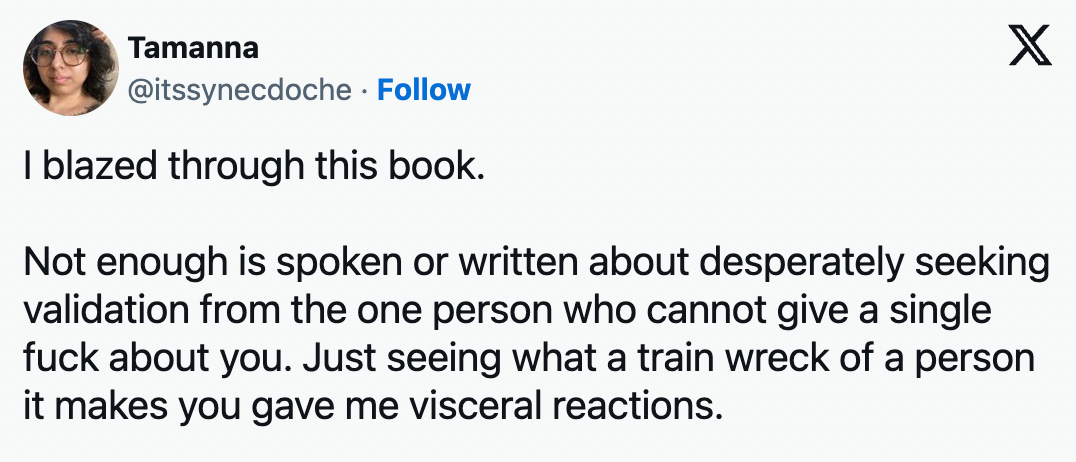
There’s a lot of internet stalking in here. Social media is almost like a supporting character in this revenge opera and Patel knows it like an evil twin. Speaking to the hosts of superb podcast Literary Friction, she explained that “I wanted to move past the internet as this surface reflective, still thing, It has an appetite for me, It has a mouth. It needs our emotions, our lust, our envy … so we stay fixated on it.”
The combative nature of I’m A Fan was refreshing. “I wanted the reader to feel sick, I wanted to terrify them,” she says.

“I feel like art has become this very safe place where you can interact with it but essentially stay the same because it deals with your topside life and you can feel smart and clever and good. I wanted to write about shame and darkness and things you don’t want to admit to yourself, I wanted to fundamentally rearrange your brain, so I hope I’ve done that. Or come close to it.”
The author strove to craft a book of startling originality, smashing together high literature and mass culture, then pouring over the sentences so they hit like our own raw experiences. What she has also tried to offer is a degree of solidarity in a cautionary tale. “Fiction is transportive and the best thing about it is that it makes you feel less alone, less weird,” she told Bomb.
“The authors are friends who reach out across time to walk alongside you for a bit. Reading fiction is really the only way to live multiple lives. There are some books I carry within me, whose storylines and characters I use as warnings or inspirations. I’m sort of glorifying it, but it’s the closest I feel to God when I’m writing – whatever form that takes.”
Killing and catching feelings
Hihi…
If you’ve been watching the Prime series Mr & Mrs Smith, you will get the joke. A remake/spin-off from the Brangelina film of the same name, we meet ambitious rookie spies John (Donald Glover) and Jane (Maya Erskine, get to know) who are put together as partners on a series of fairly inconsequential missions while posing as a married couple in Manhattan.
Their reasons for choosing such high-risk work are unclear. Is it the pay, the thrill or something else? The show shifts the focus from keeping secrets to the evolution of the relationship itself. So the episodes mirror key milestones, from first date, first vacation and first fart 😝 to couples therapy and so on.
Jane is strictly business, at first, while John looks … interested. Through awkward exchanges, guard-down interludes and a shared need for companionship after a hard day at the office, the two begin to catch feelings.
It’s in these early glimmers of vulnerability and intimacy where Mr & Mrs Smith is most interesting, subverting genre tropes while leaving room to showcase the comedic chops of its leads. (Props to Erskine, in particular, who replaced Phoebe Waller-Bridge with no chemistry read and owns the part.)
Things go wrong on the job and it’s not long before we see familiar cracks start to appear in the ‘marriage’. Annoying but funny quirks become irritations. There’s jealousy. Jane appears to be better at the job – less reckless and therefore more valued by their faceless employer – which bruises John’s ego as the take-charger whose kill list is bigger than hers. He needs to feel needed, dominant even. So this is why you shouldn‘t work with your other half.
Jane cuts communication with her father while John, it turns out, has been speaking to his mum every day. Jane wants to progress in the company while John is keen to start a family. He confides in another woman which raises accusations of betrayal. Were they ever really compatible?
The sets and locations are lavish (from the slopes of The Dolomites to the waters of Lake Como) and the cameos are glittery including Paul Dano as a nosy/hot neighbour, Sarah Paulson as the pious therapist, John Turturro as a kinky target and Michaela Coel as the other woman.
But what keeps you watching is the genuine chemistry between Glover and Erksine, who can go from playful ribbing and lovey-dovey affection and to seething resentment. That and the shady motives of the company. What are their plans for Jane and John?
This tension between married spies had me thinking about one of the great underappreciated series, The Americans. Have you seen it? There’s even a subtle reference in Mr & Mrs Smith where John wonders why they were paired. Jane thinks it’s a KGB thing, saying, “You draw less attention as a couple, and you’re less likely to defect if you’re reliant on a partner.”
A quick summary. Philip (Matthew Rhys) and Elizabeth Jennings (Keri Russell) are sleeper spies living in suburban Washington, posing as travel agents while fulfilling missions for Mother Russia at the tail-end of the 70s. This is a deadly effective duo, now into their second decade of service, but we quickly sense there is a distance between them.
Here is a couple that often disagrees with, and disappoints, one another. They are parents who are scrambling to do their jobs while neglecting their kids. Son and daughter are growing up too fast, craving answers, kicking out for independence.
For all the killing these two do for their country – and believe me, this show has it all, from strangulation to stabbing, decapitation to dismemberment – there is a relatable yearning for a quiet life, happiness and fulfilment amid all the chaos.
The FX show does a great job of harnessing maximum tension from split loyalties and the psychological toll of committing despicable acts and keeping secrets. At its core, The Americans is a nuanced character study – graphic yet understated, bleak yet touching – whose ruse is to cloak a relationships drama in the uniform of espionage.
I wrote a long read for Custard TV a few years ago. Bookmark it and tuck in once you’ve watched it because there are spoilers galore.
The Aftershow
The man who collects lost pet posters
is on Substack, yay! I never tire of raving about her stories.Reading about LA musician, producer and radio host Don Bolles’ collection of lost dog posters from the 70s/80s made me want to get my Bassett, lose him, make my own ridiculous and mushy petition/declaration of love by hand, then wait to be reunited in slow-motion 🎥 🐶
There’s so much character and whimsy in analogue chapters of life like this. Each personalised, posted-up piece of paper evokes faith in humanity and the lengths someone went to in the hope of a happy ending.
12 questions for Jia Tolentino
Here’s one of my favourite answers from
’s revealing interview with The New Yorker writer and Trick Mirror author Jia Tolentino. I like the way her mind upspools and she unpacks her thoughts. Often, it’s from a place of inquiry and conjecture rather than knowing with certainty.55 observations from taking a year off work
Itinerant revelations from the desk of Mr Fxcking Bingo. In 2023, the sweary artist decided to take a year off work, purchase a one-way ticket to Sri Lanka and freestyle the trip based on conversations he had along the way.
I am an eternal, journal-clutching traveller at heart so this was tailormade for me. Top tips:
9. Listening to a good song whilst staring out of a train window is and will always be great.
14. There is more community in hard-to-reach places.
17. Not being afraid to ask stupid questions is a really important skill when travelling alone.
25. If you return to a place from your past and barely recognise it, sometimes it’s not because that place has changed, it’s because you’ve changed.
45. Spending time with people with opposing views to your own can be enriching and fascinating. I found myself alone in the desert with five right-wing, religious, gun-toting Trump supporters one night. Unlike interactions between strangers on the internet, we listened to, respected and even enjoyed each other.
A swift one at the King’s Head
You may well chuckle along to the Adam Curtis vibes of Deadpubs' Tiktok reviews, and some of the tickling turns of phrase, but these are also really interesting. Start with the King's Head in Finsbury Park. I also like his take on Brewdog in Waterloo (“infernal pint creche for confused children”).
Everyone’s a sellout now
“Next thing you know, it’s been three years and you’ve spent almost no time on your art,” he tells me. “You’re getting worse at it, but you’re becoming a great marketer for a product which is less and less good.”
Artists, writers, creative folk… Is the unrelenting chore of self-promotion jeopardising the quality of your work? This a thought-provoking article about the tyranny of the personal brand and the commercial realities of an uber-competitive attention economy.
What’s the answer?
1. Adapt
2. Get a daily planner
Alternative:
suggests that staying off the internet and not having a personal brand is perhaps the best personal brand of all.Barbara Kruger: Thinking of You. I Mean Me. I Mean You.
Walking around Kruger’s exhibition at London’s Serpentine Gallery is like being assaulted by uncomfortable truths. This is ‘advertising’ with a conscience and commentary with teeth. A barrage of cut-and-paste imperatives and other slogans collaged at different scales, alongside video billboards (aka replays) and soundscaped installations. They expose fallacy, hypocrisy, deception, corruption and incite rebellion on familiar battlegrounds including politics, race, class and gender.
A former graphic designer for Condé Nast, Kruger is well-versed in the art of image selection and juxtaposing microcopy on a page. But her scrutiny of mass media and how words are quickly devolved of core meaning when recontextualised or deployed recklessly – headlines as quick takeaways, posted comments as statements of fact – is what gives her work its longevity in the age of high-velocity digital culture.
This 2014 conversation between Kruger and curator Iwona Blaswick, who offered the artist her first big show at the ICA in 1983, is very good. At one point Blaswick quotes the philosopher Wittgenstein, who seems to nail the knack of Kruger: “Sometimes an expression has to be withdrawn from language and sent for cleaning. Then it can be put back in circulation.”
These super-direct provocations on the walls and floors engulf us and force us to engage. Some are more encoded than others. They raise doubt. The message is clear: question everything in front of you because often there is a multiplicity of meanings.
This is a presentation about the power of language. Its potential to remind us who we are and how we could better relate to one another.
Tip: go slowly.
Two Star & The Dream Police
Mk.gee’s latest album makes me want to play this damn guitar right here. I'm seeing waves gently rolling up the shore under a cobalt, starry sky. I'm hearing early Sting and Todd Rundgren produced by Jai Paul with Jaco Pastorius dropping in on the session.
That bari-tone he gets is spellbinding, while the array of textures in the production takes the 26 year old’s music making into the realm of world building. ‘Dream Police’, ‘Rylee & I’ and ‘Breakthespell’ are my highlights but that will change tomorrow.
An oldie but goodie interview here. “I’m kind of just in the playpen. If an idea happens, it happens.”

